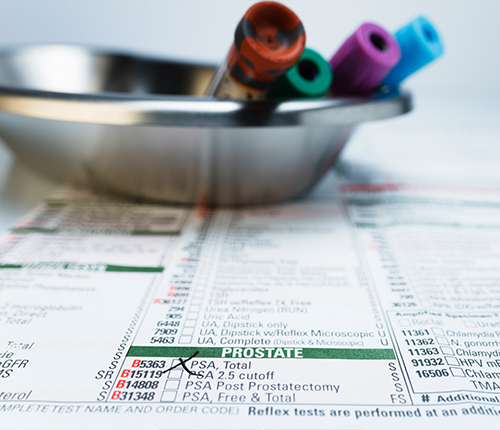1 IN 8 MEN WILL DEVELOP
Prostate Cancer
Prostate cancer is one of the most common types of cancer in men. It usually progresses slowly, will require monitoring, and may require treatment. Aggressive forms of prostate cancer can be treated with multiple therapies.

Diagnosis
Risk and symptoms
You have a higher risk of developing prostate cancer if you are African American, older than 50, or have a family history of prostate cancer. Typically, prostate cancer does not cause symptoms, but some men with prostate cancer may experience difficult or frequent urination, weak urine stream or blood in the urine.

Ready to make an appointment?
Looking for a second opinion?
We understand how overwhelming it can be to face a recent urologic cancer diagnosis. Our team of experts is here to provide a second opinion, empowering you to make well-informed decisions about your treatment and giving you the peace of mind you deserve. Schedule an appointment with us today, and let’s explore your options together.
Treating Localized Prostate Cancer
- Watchful Waiting
- Active Surveillance
- Radical Prostatectomy
- Radiation Therapy
- Advanced Prostate Cancer
Watchful waiting does not involve any treatment. Instead, the cancer is carefully monitored and treated only if symptoms develop. This is typically reserved for men who are older or have significant medical issues.
Active surveillance is a management option for men with slow-growing prostate cancer without aggressive features. Low risk prostate cancers can monitored with imaging, lab tests such as PSA, and periodic prostate biopsies to ensure the cancer is not progressing and needing treatment. Additionally, an MRI-fusion biopsy may be done.
Radical prostatectomy involves the surgical removal of the prostate gland and sometimes the lymph nodes in the pelvis. This procedure is commonly performed using the Da Vinci robotic surgery system.
Radiation therapy is a non-surgical option for treating prostate cancer with high-energy rays. There are various forms of radiation therapy, including intensity-modulated radiation therapy and brachytherapy (prostate radiation seed implantation). Hormone therapy may be added to radiation therapy to improve treatment outcomes. Learn more about radiation treatments in our center of excellence.
Advanced prostate cancer includes aggressive prostate cancers still located in the prostate gland, recurrent prostate cancer after prior treatment, or prostate cancer that has spread to other areas of the body (metastatic). Advanced prostate cancer often requires an individualized treatment plan using a combination of multiple therapies. Visit our advanced prostate cancer center of excellence to learn about the treatments.
Meet the Localized Prostate Cancer Doctors
Make an Appointment
We welcome new patients and patients from our former practices. Please call your local office to make an appointment.


















